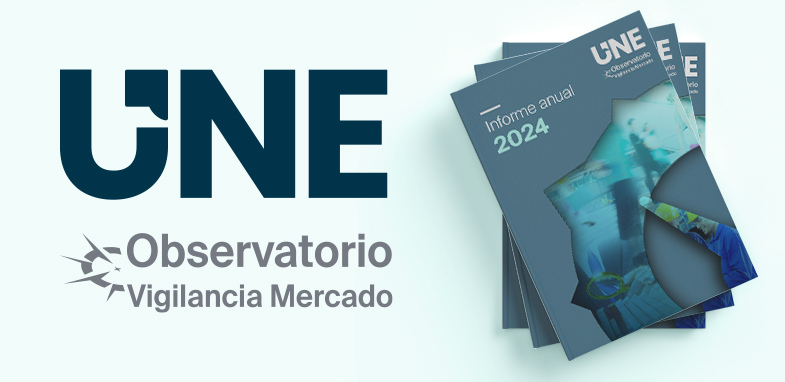
The Market Surveillance Observatory (MSO) comprises more than 50 Spanish business organisations that are members of UNE, the Ministry of Industry and Tourism, the Ministry of Social Rights, Consumer Affairs and Agenda 2030, and various authorities tasked with market surveillance. Its aim is to strengthen public-private cooperation in this area and promote compliance with technical standards and legislation.
Fourth Annual Report
For a fourth consecutive year the Market Surveillance Observatory (MSO) of the Spanish Association for Standardisation, UNE, has published its annual market surveillance report in an effort to strengthen public-private cooperation in this area and promote compliance with technical standards and regulations. The goal is to raise awareness of the marketing of products and services that are unsafe or misleading, harm the economy, companies and consumers and create unfair competition and market distortion as Alfredo Berges, chair of UNE and its MSO, says in this video.
The 2024 Annual Market Surveillance Report includes data on the inspection activities carried out during 2023. It was prepared in partnership with more than 50 Spanish business organisations that are members of UNE, the Ministry of Industry and Tourism, the Ministry of Social Rights, Consumer Affairs and Agenda 2030, and various authorities tasked with market surveillance.
Daniel Arribas, the Director General of Consumer Affairs, said: “In recent years European consumer protection legislation has mushroomed. I would like to underline UNE's role in helping to raise awareness in the sector of the new developments and challenges posed by these new standards and in conveying through its annual report the efforts made each year by public authorities in market surveillance.”
Alfredo Berges commented: "UNE's Market Surveillance Observatory shows once again this year that compliance with technical standards and legislation is essential. I would like to draw attention to one aspect of this 2024 Annual Report, the need for greater controls on marketplaces, online sales channels where the largest number of unsafe or faulty products is concentrated,” he added.
According to figures from the SOIVRE Inspection Service, a total of 580,297 items of industrial products were submitted for inspection in 2023, 96.6% of which were approved, in the following product groups:
consumer textiles (254,902), consumer footwear (184,075), toys (60,525), furniture (54,761), small electrical material (20,466) and wood for use in construction (5,568). The main reasons for non-compliance were the lack of technical documentation to guarantee the safety of products, followed by non-compliance with the labelling and marking of products, and due to construction defects that cause non-compliance with the essential product requirements.
In addition, according to data from the Directorate-General for Consumer Affairs, the Quality Control and Research Centre (CICC) carried out 45,075 tests on samples of food and industrial products from national and regional market surveillance campaigns, EU campaigns and other official inspections, and concluded that 82.78% of these tests complied with applicable regulations. The most frequent defects identified for both product categories were labelling and presentation, net contents of the package, safety aspects and quality factors.
As for the Non-Food Consumer Product Alert Network system, in 2023 it managed 2,899 notifications, 475 of which were generated by Autonomous Communities, while 2,424 were from the EU. Madrid was the Autonomous Community with the most notifications (106), followed by Galicia (91), Catalonia (65), Castilla-La Mancha (61) and Andalusia (38). Almost 49% of the products reported came from Asia.
The 2024 Report covers economic sectors divided into three main areas: products for children, leisure products, industrial household consumer products and industrial products for professional use.
The role of UNE member business organisations is key in this surveillance work as every year they run initiatives to identify products that do not comply with the applicable legislation, support public authority inspections and lead the creation of standards.

